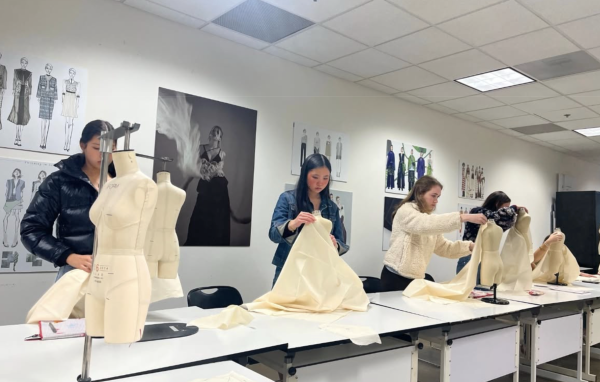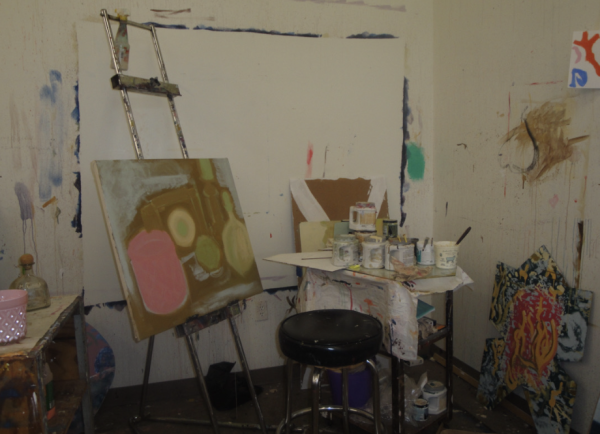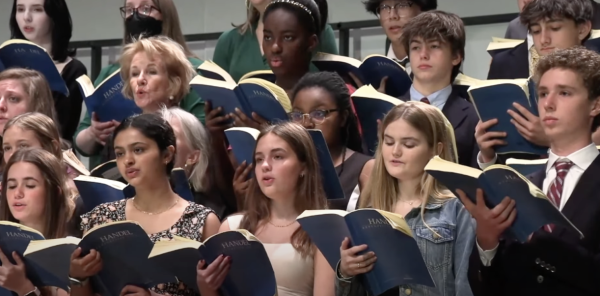From Hollywood to Broadway, students explore the arts
Lights, camera, action. “Music and Movies” returned as a highly anticipated JanTerm course this year. The course focused on the role of music in film, television, and movies as well as developing students’ critical reading and writing skills.
“In the big picture, we [were] trying to teach liberal arts skills like writing, presenting in public, researching, [and] critical listening,” said Upper School instrumental music director Scott Stewart. “The main point [was] some of these collegiate type skills, but we [also did] a lot of history of film and film music.”
Working together for the second year, co-teachers Ellen Vesey and Stewart slightly altered the course to guarantee students an insightful experience.
“We put sort of a self-selecting filter on the enrollment because we really wanted students to have some musical background,” said Vesey. “This year, we [had] a lot of kids who [were] very good at music already so the level of discussion [was] a little higher and we [were] able to dig a little bit deeper than last year.”
Vesey and Stewart hoped to develop students’ appreciation for film music.
“A lot of times, when students watch movies, they don’t think of it as art and watch a movie passively,” said Vesey. “One of the things we [were] trying to get them to think of is film and soundtrack as works of art, and that if you listen carefully, actively, and constructively, there’s a lot lurking there. It could deepen your appreciation of the movie or of the story.”
Stewart wanted students to learn to distinguish the quality of film music while analyzing it.
“There’s good film music and bad film music,” said Stewart. “I think we [were] trying to give them what we consider to be exposure to high-quality, well-crafted, and artistically meaningful movies and music.”
Over the course of three weeks, students were able to become active listeners and were inspired to expand this knowledge to personal interests.
“My favorite part [was] watching the clips and actually being able to have the skills to analyze soundtracks,” said senior Lisa Xiao. “Next time I watch movies, I’ll notice the music and see how it changes the effects or helps enhance the emotions that the movie tries to get across. I watch a lot of anime and I haven’t really analyzed the soundtracks in it, so for my final project, I [did] a comparison between anime and cartoons.”
One of the highlights of the class was the trip to Los Angeles. Students experienced immersion into the culture of Hollywood film music business. They met with composers, sound editors, arrangers, orchestrators, and conductors. Some places they visited include Fox Studios, Warner Brother Studios, private composer studios that work for the bigger networks such as television and Netflix, and the studios of prominent video game composers.
“We learned a lot about the ins and outs of making it in the industry,” said Xiao. “We got to tour John Powell’s house, and he taught us a lot about his process of coming up with soundtracks and music, such as how he composes and how he organizes it.”
If nothing else, Stewart wanted students to remember one thing.
“Listen carefully to everything,” said Stewart. “We live in a very noisy world, but we need to check out some of the beauty in the world through our ears.”
“Pounding 42nd Street,” taught by director of theatre arts Kate Morgens, chorale music teacher Michael Dauterman, and chorale music director Mason Copeland, entered JanTerm as the first performance-based class. Split into a regular group and advanced group, the class suited aspiring theatrical students of all different levels. The regular group studied musical theater history and performed some musical scenes, researching historical, social and political influences of different shows. The focus was doing theater and musicals for social change. The advanced group put together the musical Company and performed it for the school in Kellett Theatre.
“While I think research is incredibly incredible, I feel like watching them perform for each other and watching them learn how to get a really good technique for themselves [was] the best part of the class,” said Morgens. “That was our goal for the class- to have them perform.”
Experiential learning was conducted through various field trips including a visit to Theatrical Outfit, where alumnus Adam Copeland was directing a show; Alliance Theatre, where students got to walk on the catwalk; and other theaters in town where musicals are produced. Innovative learning continued in the classroom with dance master classes and Skype lessons with actors and composers.
Through three weeks of performing, Morgens wished to convey an artistic message to students.
“For the regular group, I hope that they [saw] musicals not just for being fluffy, silly things,” said Morgens. “For example, agents of social reform are beautiful thoughts. For the advanced group, I think their goal [was] how to get a technique to work as an actor.”
Students found the process of putting on a musical rigorous but satisfying.
“The challenges [were] making sure you kept up the energy and [had] everything memorized,” said senior Jake Smith. “It’s given me a feeling of what it’ll be like in college and the professional world – how much work goes into maintaining health, work ethic, and sleep throughout an intensive project like this.”
Smith, an aspiring theatrical actor, was able to discover more about himself as an artist through the course.
“I think it [was] interesting to learn about my own abilities and how they fit into an ensemble setting when dealing with this sort of stress,” said Smith. “It [was] interesting to observe how my own demeanor and behavior have reacted to it, and I like to hope that I held my own well enough.”
Though the course focused on the performing aspect, Morgens believes the course taught a valuable life lesson as well.
“I think the joy of working really hard to put together something that they [were] scared of doing and even learning that they [had] the confidence to do something like this [was] so challenging,” said Morgens. “It [was] giving themselves a challenge and rising to the challenge- that’s what I hope they remember.”



